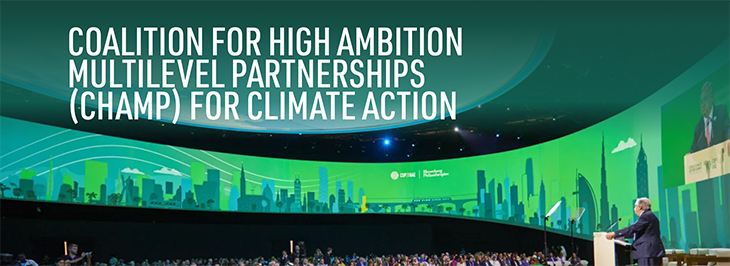COALITION FOR HIGH AMBITION MULTILEVEL PARTNERSHIPS

.
Recalling the Paris Agreement’s recognition of the importance of engagement of all levels of government, and subsequent decisions by the Conference of Parties (COP) to the United Nations Framework Convention on Climate Change (UNFCCC) on multilevel engagement, including the establishment of the High Level Champions at COP21 and their establishment of the Marrakech Partnership for Global Climate Action at COP22, the introduction of the Talanoa Dialogue process at COP23, and the COP26 Glasgow Climate Pact,
Reaffirming that collaborative and science-based climate action coordinated between national and subnational governments – including cities, towns, states and regions – is critical and creates additional potential for emissions reduction, building resilience, and avoiding severe climate impacts,
Acknowledging respective national legislations, regulations, and circumstances, and the UNFCCC and the Paris Agreement as the primary intergovernmental fora for the global response to climate change.
Encouraged by the work and contributions of non-Party stakeholders, including cities, towns, states and regions, to the Paris Agreement process since its adoption,[1] the inaugural convening of the Ministerial Meeting on Urbanization and Climate Change at COP27 and its second iteration at COP28, and the work of the Local Governments and Municipal Authorities (LGMA) constituency to the UNFCCC,
WE, THE COUNTRIES IDENTIFIED BELOW, GATHERED AT COP28, PLEDGE TO:
Join the Coalition for High Ambition Multilevel Partnerships (CHAMP) for Climate Action in order to enhance cooperation, where applicable and appropriate, with our subnational governments in the planning, financing, implementation, and monitoring of climate strategies, including but not limited to Nationally Determined Contributions (NDCs), National Adaptation Plans (NAPs), National Biodiversity Strategies and Action Plans (NBSAPs) and Long Term Low-Emission Development Strategies (LT-LEDS), to maximise climate action, including through coalitions such as the NDC Partnership, with a view towards collectively pursuing efforts to limit the temperature increase to 1.5°C above pre-industrial levels, and increase adaptation and resilience.

Leave a Reply